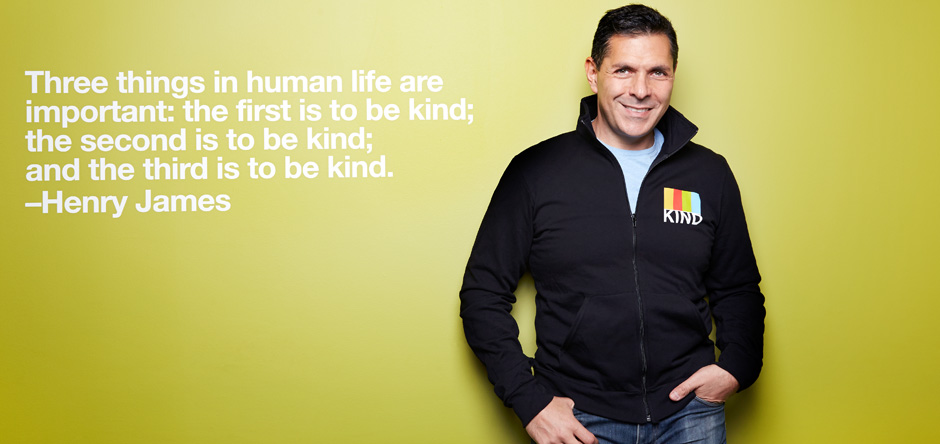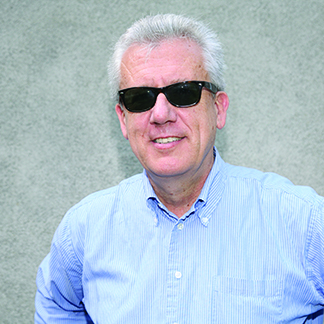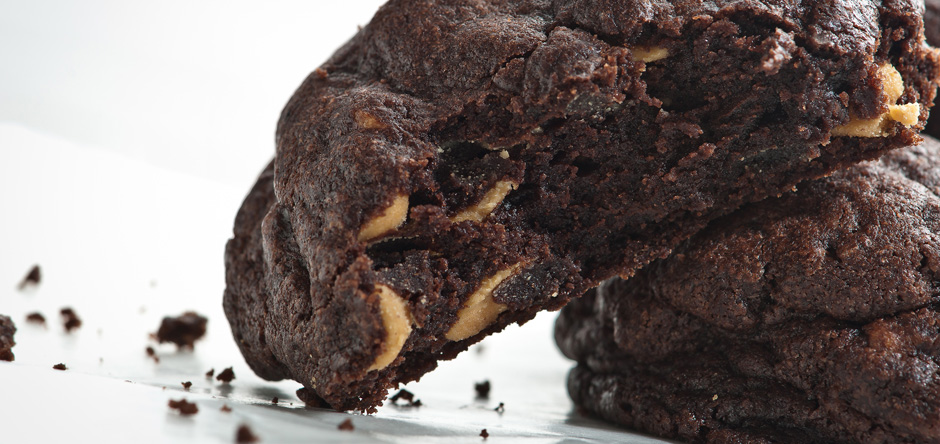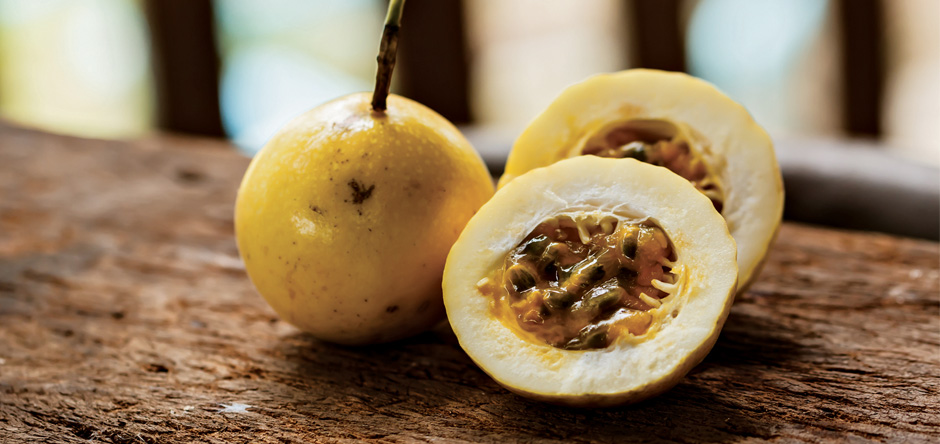Photographs courtesy KIND.
How many multimillionaire businessmen throw an arm around you and greet you with a hug?
And ask about you and your family?
And actually pay attention and ask follow-up questions?
Only one that I personally know of — Daniel Lubetzky, founder and CEO of KIND Healthy Snacks.
We met for a talk just prior to him taking the stage for a Q&A with billionaire businessman Edgar Bronfman Jr. before 300 international entrepreneurs at the Endeavor retreat at Doral Arrowwood in Purchase.
Lubetzky apparently lives by what he writes, as in his new book, “Do the KIND Thing,” with a subtitle “Think Boundlessly, Work Purposefully, Live Passionately.” (Ballantine Books)
Before creating KIND Healthy Snacks, the self-effacing, Mexican-born businessman — who describes his voice and idiom-skewing language as similar to that of Desi Arnaz’s character, Ricky Ricardo — took the much stepped-on “Think locally, act globally” slogan to a new plateau.
After earning his law degree in 1993 from Stanford University, Lubetzky received a Haas Koshland Fellowship to address legislative ways of creating joint ventures among Arabs and Israelis. His research culminated in “Incentives for Peace and Profits: Federal Legislation to Encourage U.S. Enterprises to Invest in Arab-Israeli Joint Ventures.”
While holed up in his apartment in Tel Aviv doing the research for the paper, hunger got the best of him so he headed down to the grocery story and bought a jar of sundried tomato spread — an item not known to American consumers back then. He spread it on pita bread, wolfed it down and wanted more. But alas the manufacturer went bankrupt and there was no more to be found. Undeterred, Lubetzky tracked down the Israeli manufacturer who had imported the tomatoes from Italy and the glass jars from Portugal and convinced the man to create a new manufacturing paradigm that not just created new business partners but shattered geopolitical walls.
Jars would soon be coming from Egypt, sundried tomatoes from Turkey and olive oil from Palestinian farmers.
Seeking economic cooperation across tense, ethnically charged borders provided a foundation in 1994 for PeaceWorks Inc., what Lubetzky calls a “not-only-for-profit” business corporation that seeks peace as well as profit.
Lubetzky more than ably proved his thesis, turning the theory into real-life practice. He returned to the United States, abandoned his nascent law career and dove headfirst into marketing the spread, named “Moshe & Ali’s.” However, mistakes and miscues followed — leaky jars and poor price points. But he overcame the lows to reach the highs the company he created in 2003 is now experiencing.
DRIVE TO SUCCEED
Offstage, as his young son plays, we talk about the book. About midway he writes about how his company tries to let food keep its soul. But, I say, the book is also about Lubetzky baring his soul.
“I really wanted to make sure the book was very transparent and very authentic and it highlighted my failures even more than my successes, because I think you have better chances to learn from those than from just the successes. The failures highlight what you should do differently so it helps you point out those lessons,” he says.
The Harvard School of Medicine shows that people who eat nuts extend their lives, he says. “The more nuts you eat, the more you live,” he smiles.
“There’s a lot of evidence nuts help with cardiovascular function.”
When he asks about my family, I mention that my 92-year-old dad has been eating all kinds of nuts his entire life. Lubetzky nods his head in agreement with his company’s own pursuits.
It has to do with “wholesome ingredients you can see and pronounce,” he says.
“In terms of consumer preferences, the stuff we’ve done over the last five years is far better performing than some of the originals. But some of the originals are really magical, too. The fruit and nut bar I think is just excellent. A really good example of how the sum of the parts is greater than the individual components.”
Lubetzky tells me what drives him, his people and the company.
“We take inspiration from seeing what products and ingredients are both nutritional but also tasty and inspiring. But primarily we think creatively ourselves. We have a phenomenal team that is very, very creative and artistic. Part of our success is that we’re more artistic and creative than data-driven or scientific. We try not to drive our innovation based on what the data tells us or what the people are doing. I think it’s a mistake… it leads to you being a copycat. You end up relying on the past rather than the future … You cannot create something new if you’re just looking at what’s succeeding in the marketplace, because what’s succeeding in the marketplace by the finish then already exists. So how much value can you create for society when you’re just copying?”
In staying true to his customers that he calls fans, does he tweak the bars at all?
“To some degree we’re always optimizing. …We don’t use any artificial ingredients. …When we use fruit some of the products are sticky… We’re constantly trying to optimize to make them less sticky without sacrificing our values. So we’ve reduced sugar content in some of our items over the years, but nothing radical. We really try to keep the brand promise of once people have experienced a product there’s gonna be a very high bar for us to change the product because that’s what people like.”
LUCK AND TIMING
With success comes scrutiny. Earlier this year, the U.S. Food and Drug Administration took exception to KIND using the word “healthy” on its labels.
“The FDA didn’t complain about us using the term ‘healthy.’ They complained about us using the term healthy as what they call a ‘nutrient claim.’ We don’t really know that we used that as a nutrient claim. But we wanted to be respectful … we wanted to hold ourselves to a higher standard and not be dismissive. We’re making all the changes they asked us to do … They’re not going to change our performance,” Lubetzky says.
“The core thing that we learned from this and I think is important for society is we need to update those regulatory standards, because as you stated in your conversation about your father, whole ingredients are good for you. Nuts are good for you. And we should not discourage consumption of them under the current standards that would make a nut-based snack not qualify as a healthy snack. But a product that’s made with ‘frankenfood’ that you could not recognize and with artificial compounds can be defined as healthy. It makes no sense.”
When the FDA issue came to light, he remained transparent, addressing it for his customers on his website in “A note to our KIND community.”
Remaining true to himself has helped Lubetzky in all his dealings.
“When somebody is being tough, it’s very hard for me to not try to win them over. I don’t know if it’s connected to my father’s survival from the Holocaust. Truly, the more I think about myself, this need to be liked and to win people over has a connection to the stories I heard of what my father went through and wanting to build bonds. I hate being hated and I don’t like having enemies. And I think part of it is connected to my heritage as a son of person who was in a concentration camp and whose family was exterminated. But that does help me be resilient and not give up.”
In reading his book, it seems luck didn’t come into play for him. Did it?
“Absolutely it did. I don’t have false humility. I am very self-confident. I don’t think I have a big ego; I have a very healthy ego. I know that I’m successful. I know that I’m smart. I know that I work hard. But luck absolutely comes into play. Timing is so much. Yes, I saw people’s desire for (a healthy natural ingredient bar) 10, 20 years before others. That helped me a ton.”
“But there are so many pieces related to luck. …You can call it luck, fortune, you make your own luck. A hard work ethic, not giving up, being introspective and self-critical — those things matter a ton.”
He says he still has a jar of sundried tomato spread on his desk to “remember my mistakes and keep me humble and to remember my journey.”
Perhaps if Lubetzky has any more encounters with a federal agency he should drop the name of a big fan he has in his corner — President Barack Obama.
Meeting with the president in mid-May at the White House, the president told Lubetzky that he brings KIND bars when traveling on Air Force One and Marine One.
How’s that for an endorsement?





